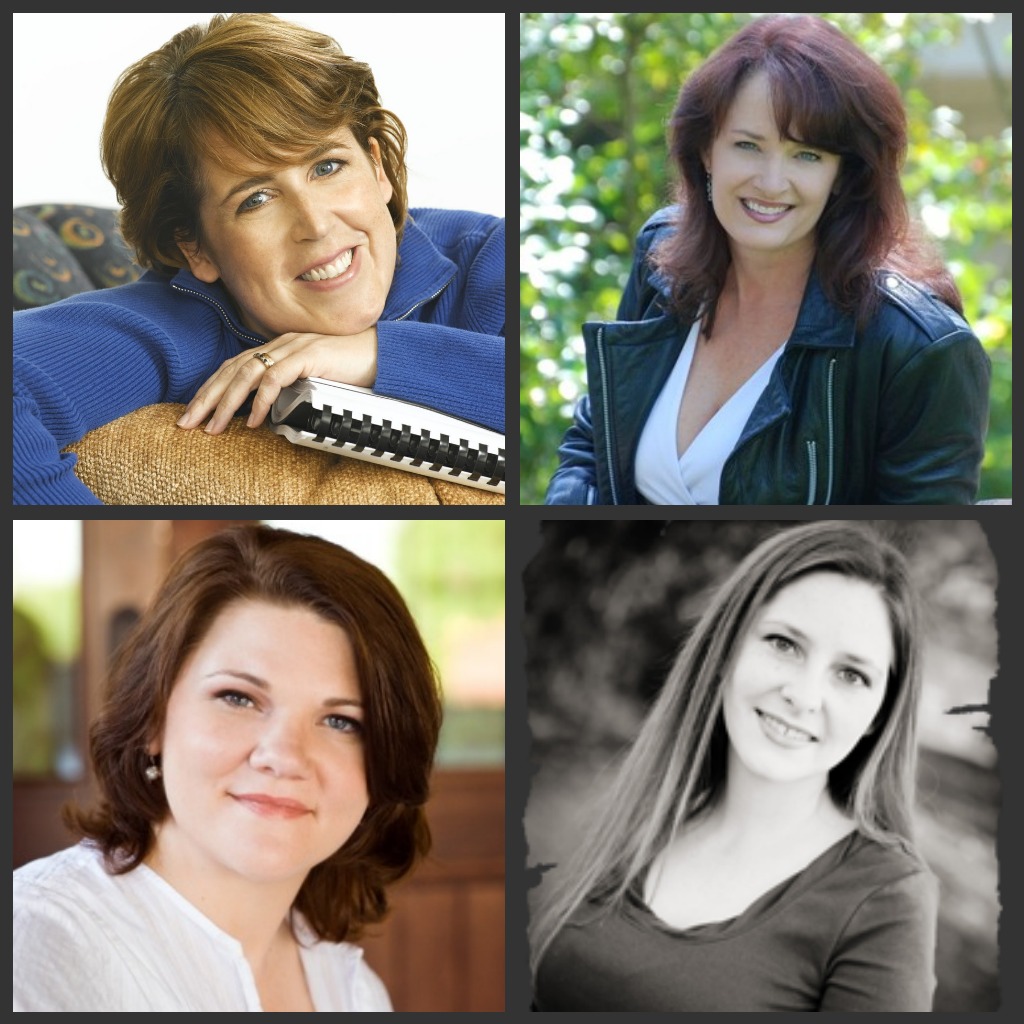
(from upper left) Kelley Armstrong, Diana Rowland, Jaye Wells, Rachel Vincent
A panel of bestselling urban fantasy authors discuss how they go about creating and managing their Urban Fantasy worlds, moderated by Jackie Morse Kessler (who is the first voice you hear). I’ve only written up the first ten minutes below, just to give you a taste of the conversation – for the rest, you’ll have to listen!
JMK: When you create your world, what part of world building, say, is the most fun, what’s the most interesting? Is there anything like pulling teeth that you really wish you didn’t have to do? What gets your juices flowing when you have to start creating a world?
Diana Rowland: I write sex with a demon… Well, I mean, seriously – the demons aren’t actual demons, so I had the world building of what exactly are they, who are they, what role do they play with this world and what impact is all that going to have on all the characters, and that all has to be figured out beforehand so that you know how to layer the plot, and the stakes, and the whole series. I don’t have an open ended series – it’s going to be about 8 or 9 books, and I know exactly how it’s going to end – which means I have to know the rules from the very, very beginning in order to know how it’s going to end.
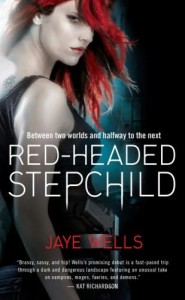 Jaye Wells: I think the most fun part for me- Well, I love everything about world building. Before I wrote my first urban fantasy I always thought it had to be like Tolkien, like you had to come up with your own language and know cartography, and that kind of thing… But then, you know, of course urban fantasy is very different. But I love research, and so it’s really fun for me to go back and read old folklore and myths, and kind of take the things you like from the stuff that already exists – and kind of take what you like, leave the rest, and combine it in a new way. I think that is really fun, that’s very exciting. The trouble is, is that it catches up with you later in the series, when you’ve make all these decisions very early on that you’re kind of stuck with and you’re like dang, why did I do that? That’s the part that’s frustrating about it, but the actual creating the world is always very fun.
Jaye Wells: I think the most fun part for me- Well, I love everything about world building. Before I wrote my first urban fantasy I always thought it had to be like Tolkien, like you had to come up with your own language and know cartography, and that kind of thing… But then, you know, of course urban fantasy is very different. But I love research, and so it’s really fun for me to go back and read old folklore and myths, and kind of take the things you like from the stuff that already exists – and kind of take what you like, leave the rest, and combine it in a new way. I think that is really fun, that’s very exciting. The trouble is, is that it catches up with you later in the series, when you’ve make all these decisions very early on that you’re kind of stuck with and you’re like dang, why did I do that? That’s the part that’s frustrating about it, but the actual creating the world is always very fun.
Kelley Armstrong: I would say that there is no part that I don’t love. I absolutely love world building, it’s probably my favorite reason for writing in urban fantasy. I could world build all day and I could give you far more than you ever want to know. But if there is a tough part, it’s leaving some of that out – not telling you everything that I know, in fact telling you very little of what I know, and letting it instead come out organically, when it’s necessary in the book.
Rachel Vincent: I think for me, the world building always comes first, the rules of the world, and I tend to develop characters based on who I need to interact in certain worlds, so it’s kind of all fun for me – except the part where I mess up, and then my editor hates me because in page proofs I want to go in and change a bunch of stuff, because it didn’t work out for the people that thought about it any.
JMK: What you guys are talking about – things that don’t work out – or Jay, you mentioned specifically stuff can comes back to bite you – um, have you guys ever made mistakes when you were doing your world building?
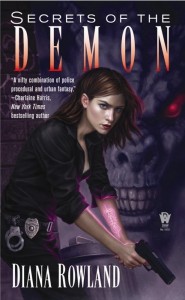 Diana Rowland: Yeah, I kind of did mess something up. I had it where my character could only summon demons on the full moon. And then I realized that’s really restrictive and makes things happen only once a month… So I had to come up with a work around where she was able to summon more than just on the full moon – and it ended up working great into other aspects of the story, and it was great. But yeah by the second book, when I going into it, I was like, well, you know, I need him twice in this month, damnit! So… And my character wanted him twice in a month too…
Diana Rowland: Yeah, I kind of did mess something up. I had it where my character could only summon demons on the full moon. And then I realized that’s really restrictive and makes things happen only once a month… So I had to come up with a work around where she was able to summon more than just on the full moon – and it ended up working great into other aspects of the story, and it was great. But yeah by the second book, when I going into it, I was like, well, you know, I need him twice in this month, damnit! So… And my character wanted him twice in a month too…
Jaye Wells: And I think that that’s one of the tricks though – Kelley mentioned that you guys don’t know everything we know about the world, and because you don’t reveal all your cards in the beginning, you can kind of be like – well, there’s this other part that I didn’t tell you about before… But it was always there, I promise! But it can be a really interesting way to come up with plot twists, too. At first you’re like, oh, I’m in a corner, and then you’re like, ooo opportunity – and so it can really work in your favor. But I mean, you do have to be consistent, because your fans do trust you, that you’re not going to all of a sudden completely change the rules, because you know, nobody wants that.
JMK: But are there any times when you can change the rules? Carefully? Like what?
Rachel Vincent: I’ve learned the hard way – really, really hard way – not to nail down characters details unless you have to, because later when you need to change the details, it’s already printed. My second young adult book, I had a line – one single line, it was a throw away line – but it messed up the plot of three separate books, and I couldn’t take it back, so I had to work around it. (SPOILER ALERT) The demons in my Young Adult books, they can’t lie. And so I had one of them say something to Kaylee, the main character, that I later wanted not to be true. He said her life line stretched out a long ways – turns out, not so much. I had to go back and amend it, in several more books – so if you find that, don’t tell me.
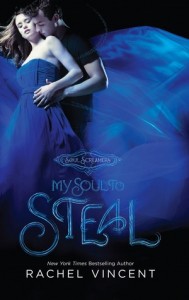 Jaye Wells: Well that’s the hard part too, is when you’re working on a long series – you’re working on book 4, and you wrote book 1 like three years ago – two years ago, whenever it was at the time -and your fans just read that book right before they read the next one, so it’s really fresh to them and they remember those details. And it may be something that you – like a throw away line – that you forgot about, that you stuck into book one. And they’re like, what about this thing? Oh, right… I need one of you to create a wiki for me, so I can just reference it really quickly. That’d be great.
Jaye Wells: Well that’s the hard part too, is when you’re working on a long series – you’re working on book 4, and you wrote book 1 like three years ago – two years ago, whenever it was at the time -and your fans just read that book right before they read the next one, so it’s really fresh to them and they remember those details. And it may be something that you – like a throw away line – that you forgot about, that you stuck into book one. And they’re like, what about this thing? Oh, right… I need one of you to create a wiki for me, so I can just reference it really quickly. That’d be great.
Diana Rowland: It’s worth it – I hired someone to do a wiki for my books. And it’s awesome.
Kelley Armstrong: I have a series bible that was compiled, on everything I said about characters, powers, the world, etc, that I can refer back to. I also have eight beta readers, who are those types of readers who re-read the series, and so they can move through every book. That doesn’t mean that I’ll never screw up, but they do save my butt a lot.
JMK: Do you ever find that something happens in the real world – our real world – that has an impact on your fictional world? For example, Hurrican Katrina, or 9/11 – has there ever been something that had such a great impact that you had to reflect it, in your world – or change something that you already had?
Rachel Vincent: I try to avoid reality.
Jaye Wells: Well Katrina is interesting, because Green Eyed Demon is set in New Orleans – obviously it’s several years after it happened, and I had to decide how much the fallout from Katrina would play into the story. And I decided in the end that I didn’t- it would be very easy to make it a Katrina book, and I didn’t want to do that, so there’s like a mention of it – in that, okay, this happened, it existed in the real world – but it’s not the focus of the story. It didn’t impact the storyline at all. But I think that’s a choice you have to make, as the author, as the god of the world you’re writing, what you’re focusing on and what you’re not.
Rachel Vincent: That’s a very good point, because if you’re not careful, you could end up making it less about your story and more about whatever it was that happened.
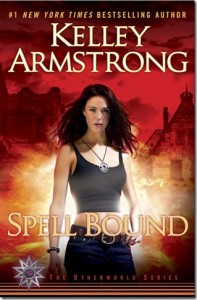 Diana Rowland: For me it was technology. When I wrote the first book, not everyone had smart phones. And they’re only a few months apart, and so now smart phones and ipads are ubiquitous, and so it didn’t make sense that my character was still using a pager, and didn’t have access to the internet where she was, because you do. And so I’ve had to adjust, just little things about how well she could get information, and google searches, and stuff like that. But that’s something you have to think about, what technology is going to be around, but because I had the timeline spaced so close together… No one uses pagers anymore!
Diana Rowland: For me it was technology. When I wrote the first book, not everyone had smart phones. And they’re only a few months apart, and so now smart phones and ipads are ubiquitous, and so it didn’t make sense that my character was still using a pager, and didn’t have access to the internet where she was, because you do. And so I’ve had to adjust, just little things about how well she could get information, and google searches, and stuff like that. But that’s something you have to think about, what technology is going to be around, but because I had the timeline spaced so close together… No one uses pagers anymore!
JMK: Touching on technology – especially for Kelley and for Rachel, who also have Young Adult series – do you guys ever find yourself at a loss for what is considered normal now for teens? Versus say when you were teens? Are you up to date in terms of technology, when you’re writing your teen stuff? Do you find that you need some help?
Kelley Armstrong: For me, I had a YA idea for years, and I waited until my daughter was 13, because then I had a captive. So she reads everything and lets me know. Technology I’m good with, because I’m a former programmer, so I’m a gadget geek.
Jaye Wells: I have a picture of her daughter in a closet somewhere – if you want to eat, tell mommy this…
Rachel Vincent: I haven’t really had much trouble with that. I think it’s probably because I still feel like I’m a teenager – but I regularly have teenagers in my YA books identifying demons via cell phone pictures. It wasn’t really an issue, it just kind of came naturally with the territory.
From the audience: Is there an app for that?
(Laughter)
There’s loads more to this panel – 50 more minutes – so head on up to the audio for the rest!








Leave a Reply